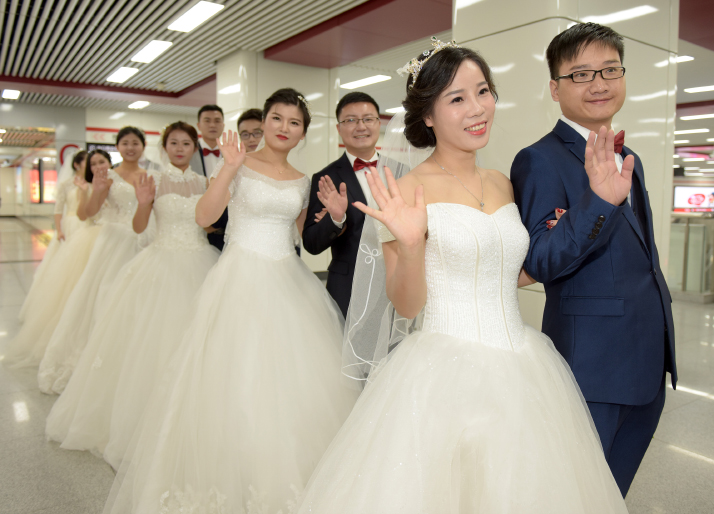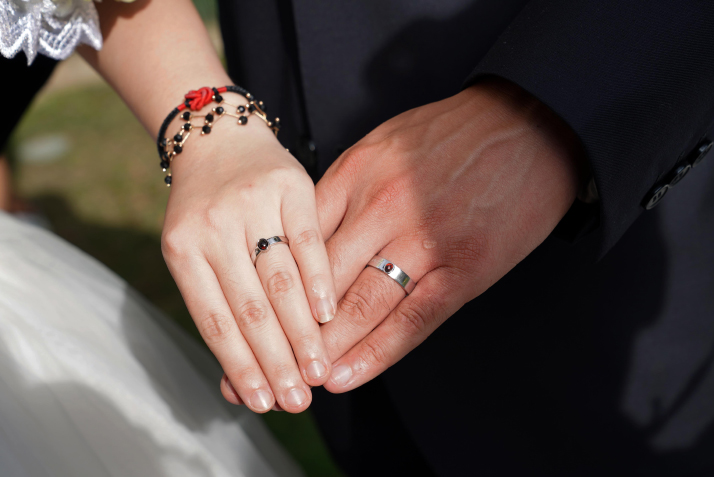|
||||||
|
||||||
| Home Nation World Business Opinion Lifestyle China Focus ChinAfrica Multimedia Columnists Documents Special Reports |
|
||||||
|
||||||
| Home Nation World Business Opinion Lifestyle China Focus ChinAfrica Multimedia Columnists Documents Special Reports |
| Nation |
| To Tie or Not to Tie the Knot |
| The reasons behind China's declining marriage rate |
| By Yuan Yuan · 2019-04-27 · Source: NO. 18 MAY 2, 2019 |
 Young couples get married at a group wedding ceremony in Hefei, east China's Anhui Province, on October 18, 2018 (XINHUA)
Even as single people of marriage age from say, 22-35 years old, are under great pressure from parents and relatives who spare no efforts in persuading them to get married, the rate of marriage in China has seen a steady decline for the past five years, hitting a new low in 2018.Only 7.2 people out of every 1,000 people got married in 2018, dropping from 9.9 per 1,000 people in 2013, according to the National Bureau of Statistics and the Ministry of Civil Affairs (MCA). The old saying that men and women should both get married when they come of age seems to be losing its power to compel singles into marriage. Today, modern young people have various reasons for not tying the proverbial knot. "Some experts cite the decline of the younger population as the main factor, arguing that the marriage rate has not seen a major change and that it is actually the decrease in the total young population that has led to the low marriage rate," Pan Jianlei, a professor at the Beijing Municipal Party School, told 21st Century Business Herald. "This is true. But it is not the only reason." The price of marriage The rising cost of living is one of the main contributors to the low marriage rate, according to Pan. Skyrocketing housing prices, especially in megacities like Beijing and Shanghai where many single adults live, have prevented them from an easy marriage decision. A survey by People's Daily found that 29.5 percent of respondents weren't married because they hadn't met the right person, while 23.4 percent said they weren't ready to take on the responsibilities of starting a family. "It is almost impossible for a couple in their 20s to buy an apartment in Beijing on their own," Dong Xingyun, a 36-year-old founder of a startup, told Beijing Review. "Normally the purchase will empty six pockets in both families and even so, many couples have to shoulder a heavy mortgage burden. This is just the start. The cost of raising a child will take another big share of the couple's income."Dong used to have a girlfriend and when he started his company in 2010, he promised her he would buy an apartment within two years for marriage. But the housing prices in Beijing rose too fast for his earnings to keep up. "My family couldn't afford to help either," Dong said. "My girlfriend finally left me. Of course we broke up for quite a few reasons, but not having an apartment was surely one of them." An apartment and a car are must-have possessions for possible suitors according to many young women's parents. This is far from an easy task for single men living in big cities. Figures show that Shanghai and Zhejiang Province, which rank second and fifth in per capita GDP in China, respectively, had the lowest marriage rates last year, at 4.4 and 5.9 per 1,000, respectively. Tianjin, a municipality near Beijing, Guangzhou of south China's Guangdong Province and Beijing also recorded low marriage rates.The pressure for single men in rural areas is not much less. "There are more men than women in villages now," a rural resident surnamed Liu from Heze City in east China's Shandong Province told Shandong TV. "Normally if a young couple plans on marriage, the groom's family needs to give betrothal money to the bride and her family and the amount has increased sharply in recent years," Liu said. "Five years ago, it was about 100,000 yuan ($14,700), but now the amount has risen to no less than 220,000 yuan ($32,340) plus an apartment in town, which could cost 300,000 yuan ($44,117) or more."  A couple displays their rings at a wedding ceremony in Shanghai on September 16, 2018 (XINHUA)
Not a necessity Even though single women may face less financial pressure of this kind, they are still showing less willingness to get married. Xu Fei, a 34-year-old accountant, is currently working in Beijing. Before that, she worked in Paris, France, for two years, and is planning to move to Shanghai later this year. Xu said that marriage is the last thing she would consider in the next several years. "Marriage means that most probably you would have to settle down in a fixed place for a longer period of time," Xu told Beijing Review. "This is what I can't do right now." With a master's degree from Peking University, Xu said that one third of her classmates who are women are still single today. "Every time we go back home for holidays, our parents ask incessantly about our marriage plans," Xu said. "I can understand their worry but they can't change my current plan." Dealing with relations with future partner's family is also a concern for single women. "When you marry a man, you don't just marry that person, you actually marry his whole social network, especially his family relations," Xu explained. "The tension between daughter-in-law and mother-in-law has long been a conundrum," Xu said. "There are long stories posted online of how hard it is to deal with it and various TV series that highlight this issue. This has also scared some women away, including some of my single friends." Yuan Xin, a professor of population studies at Nankai University, said that in China among women 30-34 years old, 6 percent were unmarried in 2015, a figure about 10 times that of 1990. Figures from the MCA show that people between the ages of 20 and 24 had the highest record of marriage registrations before 2012, while people between the ages of 25 and 29 became the mainstay in 2017, accounting for 36.9 percent of all registered couples. The delay in the marriage age is partially due to the pursuit of higher education. "It is normal for college graduates to further their studies with a master's degree these days. When they graduate, they are around 25 years old," Yuan said during an interview with China Central Television. The increase in women's income has also been a factor in the unwillingness for young women to step into marriage. More and more women don't need to seek security in marriage. A report released in March by a major housing trading platform Beike Zhaofang showed that 47.9 percent of apartment buyers in 2018 were women, evidence of women's increasing purchasing power. Among women buyers, 74.2 percent said they did not receive financial assistance from their partners, while almost 30 percent said they bought the homes on their own, without even a helping hand from their parents. "The divorce rate has continued to rise in the past 16 years," Lu Jiehua, a professor of sociology at Peking University, told Nanfang Metropolis Daily. "Family ties seem to be more brittle than years ago. Some women claim that houses can generate more sense of security than men." "For those born in the 1980s and 1990s, the attitude toward marriage and having children is changing," Lu said. "With our society being more inclusive nowadays, marriage is not the only option." Copyedited by Rebeca Toledo Comments to yuanyuan@bjreview.com |
About Us | Contact Us | Advertise with Us | Subscribe
|
||
| Copyright Beijing Review All rights reserved 京ICP备08005356号 京公网安备110102005860号 |